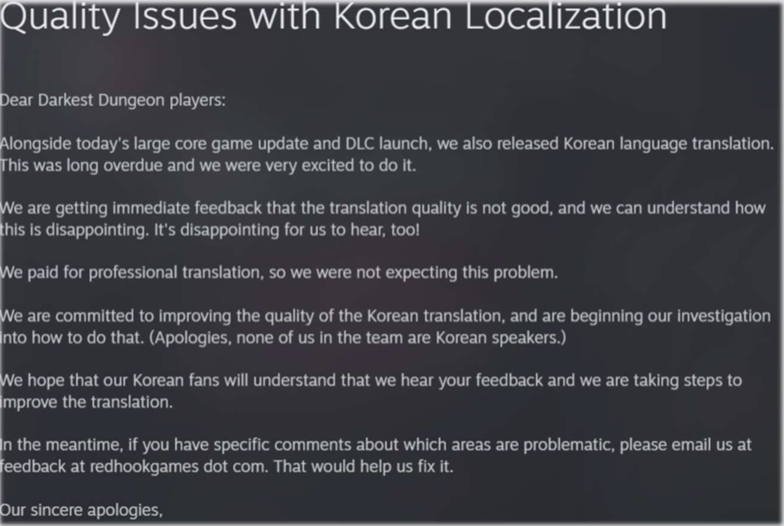
What Ruins a Localization? From Context to Quality
What Ruins a Localization? From Context to Quality
Every localization provider that’s ever existed tells everyone what makes their localization the best.
It's always native speakers, subject matter expertise, and a passion for games, but not every localization ends up being the best. We wanted to look at what can RUIN a localization.
Lack of Context
A lack of context is a classic pitfall in localization both within and outside of the games industry. Like when the classic “Got Milk?” advert was translated into Spanish as “ñTienes leche?”, meaning “Are you Lactating?”.
Game localization has some extra challenges compared to traditional software localization. This is partly due to games' different types of texts with totally different contexts; Dialogue, Barks, UI labeling, Tooltips, Item Names, Journals/Quest Logs, the list is endless.
A great example of a lack of context was noted in the German version of Grandia HD Remaster from 2019. In Grandia HD when a player using German misses an attack, instead of seeing “’daneben”, the German word for “miss”, they saw “Fraulein” meaning “Miss” aka an unmarried woman. Luckily for the devs this wasn't offensive, but it certainly brought the wrong kind of attention and caused a lot of linguists to giggle.

Credit: Nintendolife.com / @Chaz_AshIey
Lack of Quality
Having issues caused due to low quality isn’t surprising, but with localization’s power to impact the user it can be devastating. Back in 2018, the excellent Darkest Dungeon was localized into Korean after a long wait. When the localization released fans were incredibly disappointed.
The Korean localization released with problems throughout the entire game. Errors included minor mistranslations, “I began to tire of conventional extravagance” becoming an equivalent of “Nevertheless, i gave up this luxury”. Others completely changed the meaning, like the phrase “You remember our venerable house, opulent and imperial” which evokes so much feeling in only a few words, becoming an equivalent of “Remember our fancy house?”.
The thing to remember with this situation was that this wasn’t a fan translation, or a member of the dev team who wasn't a professional localizer, it was conducted by a professional translation company. That lack of quality can’t be put on the dev team who, without speaking fluent Korean, couldn’t have known about these issues. Red Hook Studios had followed the standard approach and were keen for the narrative, one of the game's stand out features, to be experienced fully.
Unfortunately, the quality was so poor that fans on Steam suggested restarting the entire localization as they thought the issues ran too deep to be fixed.
Red Hook reacted in the best way any team could; immediately apologizing, accepting fault, explaining the situation and context, and committing to fixing it. But for some fans this wasn't enough, they felt offended by what they viewed as a lack of care for their language. That’s the greatest risk of bad localization, alienating players leading to a poor reception and ultimately a lack of revenue. Whether or not it's justified, you don’t get a second chance to make a first impression.

Source: Steam
“Did Koreans do anything wrong to you? Why do you keep doing this to us†” Is not what we want to hear from your players.
Source: Steam
Lack of Native Understanding
“Native Linguists” is something you're sure to hear from every localization provider, but at the end of the day it's because native-level knowledge is irreplaceable. Native-level linguists often provide that extra level of localization that feels truly natural. But it’s not just that extra polish, it also can avoid issues that seem obvious to a native speaker.

Credit: Knowyourmeme.com
“A Winner Is You” is a classic mistranslation all the way back from Pro Wrestling on the NES. From a native English-speaking perspective, it’s obviously wrong, just a poor translation. Dig a little deeper and you’ll realize this mistake isn't just a simple mistranslation. It may be because the translator was a native Japanese speaker, rather than English. In Japanese the sentence would be correct either way, with the word for “winner”, or “you”, at the start. This extra context makes it a fascinating mistranslation and a great example of why native level understanding and fluency is critical for solid localization (especially with a language like English that's so wildly inconsistent).
Individually, these issues can ruin localization and detract from the years of hard-work. Combined, they can offend players and generate hostility to future titles. Excellent translation, however, ensures players in new regions are enjoying the same experience as those playing in the source language. That can lead to new market opportunities, additional revenue streams, and title longevity. Fortunately, these issues are avoidable.